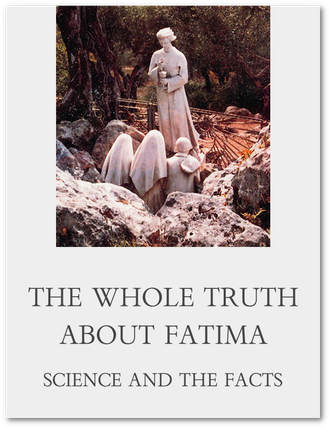450. Q. What is an effect?
A. An effect is that which is caused by something else, as smoke, for example, is an effect of fire.
451. Q. What does redemption mean?
A. Redemption means the buying back of a thing that was given away or sold.
452. Q. What did Adam give away by his sin, and what did Our Lord buy back for him and us?
A. By his sin Adam gave away all right to God's promised gifts of grace in this world and of glory in the next, and Our Lord bought back the right that Adam threw away.
453. Q. Which are the chief effects of the Redemption?
A. The chief effects of the Redemption are two: The satisfaction of God's justice by Christ's sufferings and death, and the gaining of grace for men.
454. Q. Why do we say "chief effects"?
A. We say "chief effects" to show that these are the most important but not the only effects of the Redemption --for all the benefits of our holy religion and of its influence upon the world are the effects of the redemption.
455. Q. Why did God's justice require satisfaction?
A. God's justice required satisfaction because it is infinite and demands reparation for every fault. Man in his state of sin could not make the necessary reparation, so Christ became man and made it for him.
456. Q. What do you mean by grace?
A. By grace I mean a supernatural gift of God bestowed on us, through the merits of Jesus Christ, for our salvation.
457. Q. What does "supernatural" mean?
A. Supernatural means above or greater than nature. All gifts such as health, learning or the comforts of life, that affect our happiness chiefly in this world, are called natural gifts, and all gifts such as blessings that affect our happiness chiefly in the next world are called supernatural or spiritual gifts.
458. Q. What do you mean by "merit"?
A. Merit means the quality of deserving well or ill for our actions. In the question above it means a right to reward for good deeds done.
459. Q. How many kinds of grace are there?
A. There are two kinds of grace, sanctifying grace and actual grace.
460. Q. What is the difference between sanctifying grace and actual grace?
A. Sanctifying grace remains with us as long as we are not guilty of mortal sin; and hence, it is often called habitual grace; but actual grace comes to us only when we need its help in doing or avoiding an action, and it remains with us only while we are doing or avoiding the action.
461. Q. What is sanctifying grace?
A. Sanctifying grace is that grace which makes the soul holy and pleasing to God.
462. Q. What do you call those graces or gifts of God by which we believe in Him, hope in Him, and love Him?
A. Those graces or gifts of God by which we believe in Him, and hope in Him, and love Him, are called the Divine virtues of Faith, Hope, and Charity.
463. Q. What do you mean by virtue and vice?
A. Virtue is the habit of doing good, and vice is the habit of doing evil. An act, good or bad, does not form a habit; and hence, a virtue or a vice is the result of repeated acts of the same kind.
464. Q. Does habit excuse us from the sins committed through it?
A. Habit does not excuse us from the sins committed through it, but rather makes us more guilty by showing how often we must have committed the sin to acquire the habit. If, however, we are seriously trying to overcome a bad habit, and through forgetfulness yield to it, the habit may sometimes excuse us from the sin.
465. Q. What is Faith?
A. Faith is a Divine virtue by which we firmly believe the truths which God has revealed.
466. Q. What is Hope?
A. Hope is a Divine virtue by which we firmly trust that God will give us eternal life and the means to obtain it.
467. Q. What is Charity?
A. Charity is a Divine virtue by which we love God above all things for His own sake, and our neighbor as ourselves for the love of God.
468. Q. Why are Faith, Hope and Charity called virtues?
A. Faith, Hope and Charity are called virtues because they are not mere acts, but habits by which we always and in all things believe God, hope in Him, and love Him.
469. Q. What kind of virtues are Faith, Hope and Charity?
A. Faith, Hope and Charity are called infused theological virtues to distinguish them from the four moral virtues -- Prudence, Justice, Fortitude and Temperance.
470. Q. Why do we say the three theological virtues are infused and the four moral virtues acquired?
A. We say the three theological virtues are infused; that is, poured into our souls, because they are strictly gifts of God and do not depend upon our efforts to obtain them, while the four moral virtues -- Prudence, Justice, Fortitude and Temperance -- though also gifts of God, may, as natural virtues, be acquired by our own efforts.
471. Q. Why do we believe God, hope in Him, and love Him?
A. We believe God and hope in Him because He is infinitely true and cannot deceive us. We love Him because He is infinitely good and beautiful and worthy of all love.
472. Q. What mortal sins are opposed to Faith?
A. Atheism, which is a denial of all revealed truths, and heresy, which is a denial of some revealed truths, and superstition, which is a misuse of religion, are opposed to Faith.
473. Q. Who is our neighbor?
A. Every human being capable of salvation of every age, country, race or condition, especially if he needs our help, is our neighbor in the sense of the Catechism.
474. Q. Why should we love our neighbor?
A. We should love our neighbor because he is a child of God, redeemed by Jesus Christ, and because he is our brother created to dwell in heaven with us.
475. Q. What is actual grace?
A. Actual grace is that help of God which enlightens our mind and moves our will to shun evil and do good.
476. Q. Is grace necessary to salvation?
A. Grace is necessary to salvation, because without grace we can do nothing to merit heaven.
477. Q. Can we resist the grace of God?
A. We can, and unfortunately often do, resist the grace of God.
478. Q. Is it a sin knowingly to resist the grace of God?
A. It is a sin, knowingly, to resist the grace of God, because we thereby insult Him and reject His gifts without which we cannot be saved.
479. Q. Does God give His grace to every one?
A. God gives to everyone He creates sufficient grace to save his soul; and if persons do not save their souls, it is because they have not used the grace given.
480. Q. What is the grace of perseverance?
A. The grace of perseverance is a particular gift of God which enables us to continue in the state of grace till death.
481. Q. Can we merit the grace of final perseverance or know when we possess it?
A. We cannot merit the grace of final perseverance, or know when we possess it, because it depends entirely upon God's mercy and not upon our actions. To imagine we possess it would lead us into the sin of presumption.
482. Q. Can a person merit any supernatural reward for good deeds performed while he is in mortal sin?
A. A person cannot merit any supernatural reward for good deeds performed while he is in mortal sin; nevertheless, God rewards such good deeds by giving the grace of repentance; and, therefore, all persons, even those in mortal sin, should ever strive to do good.
483. Q. Does God reward anything but our good works?
A. God rewards our good intention and desire to serve Him, even when our works are not successful. We should make this good intention often during the day, and especially in the morning.





